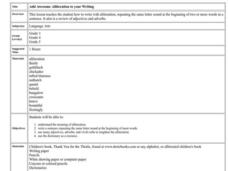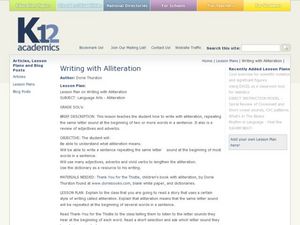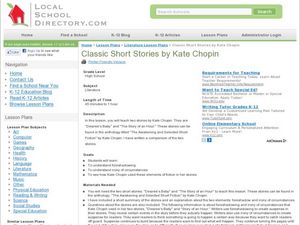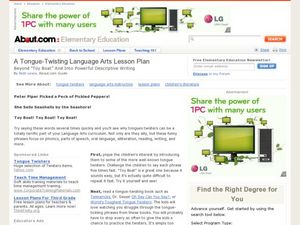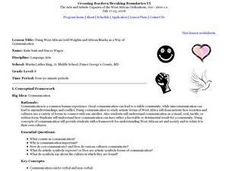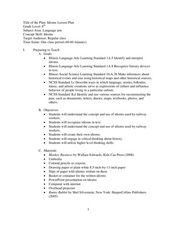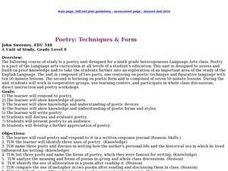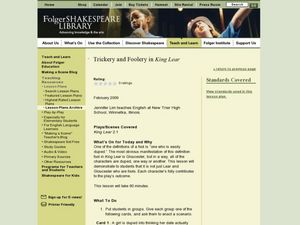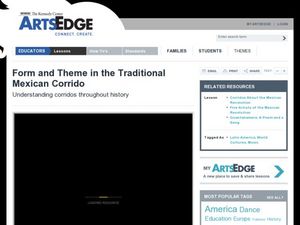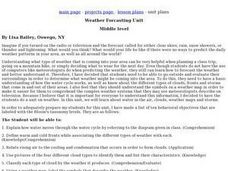Curated OER
- Making Metaphors with Munchies
Students brainstorm independently first, then ask their best friend on the team, or seat partners, depending on the year & student mix, to add to their list of personal characteristics and/or to name three words they think of...
Curated OER
Personal Patriots
First graders review the Pledge of Allegiance and symbols of America. Students discuss the sequence used to say the Pledge of Allegiance. They practice reciting the Pledge of Allegiance. Students view symbols of things they know and...
Curated OER
Add Awesome Alliteration to Your Writing
Students explore alliteration. In this writing lesson, students read the book Thank You for the Thistle and create sentences with alliteration. Students create an alphabet booklet with alliteration.
Curated OER
Writing with Alliteration
Young scholars read Thank You for the Thistle and understand what alliteration is. In this alliteration activity, students write sentences using alliteration. Young scholars choose a letter of the alphabet and the class writes an...
Curated OER
Amazing Animal Alliteration Book
Students understand the meaning of alliteration. In this alliteration lesson, students write sentences using alliteration and recognize how it changes the writing in a story.
Curated OER
Quick as a Cricket
Students explore similes through Quick as a Cricket. In this similes lesson plan, students investigate what a simile is and recognize them when they see them. Students write similes about themselves and illustrate...
Curated OER
When Turtle Grew Feathers
Students explore the Choctaw Native American tribe. In this cross curriculum literacy and U.S. history instructional activity, students locate where the Choctaw Indians lived on a United States map. Students listen to When...
Curated OER
Geologic Time Scale Analogy
Students examine geologic time to scale. In this geologic time lesson, students create a time-scale metaphor that shows some of the Earth's important events. Students present their metaphor to the class.
Curated OER
Foreshadowing and Situational Irony in Kate Chopin Short Stories
This resource contains summaries of the stories featured, but limited procedural detail. Readers compare Chopin's stories' use of situational irony and foreshadowing. High interest content (questionable paternity, missing persons) for...
Curated OER
A Tongue-Twisting Language Arts Lesson
Students discover enunciation and alliteration by reading tongue twisters in class. In this language arts lesson, students listen and repeat some of the classic childhood tongue twisters along with their teacher. Students...
Curated OER
What Makes Good Literary Writing?
Students conduct a literature study of John Steinbeck's classic "Of Mice And Men". They write in reflection of the author's influence upon 20th century literature. Students take apart the story to focus class discussion upon major themes...
Curated OER
Using West African Gold Weights and African Masks as a Way of Communication
Eighth graders discuss how communication, or lack thereof, can have either a favorable or detrimental effect on a community. They study and interpret proverbs as a means of teaching a lesson. Finally they discuss symbolism and design a...
Curated OER
Idioms Lesson Plan
Sixth graders discover idioms. In this idioms lesson, 6th graders evaluate idioms and discover their meaning. Students read Runny Babbit by Shel Silverstein and create unique idioms. Assessment rubric is provided.
Curated OER
Poetry: Techniques & Form
Ninth graders explore poetic technique and figurative language in this ten lesson unit. Comparisons are made between a variety of forms of poetic expressions and the lives of several poets are studied.
Curated OER
Trickery and Foolery in King Lear
Young scholars act out scenarios in which someone is duped or is made a fool of. In this trickery and foolery in King Lear lesson, students plan and act out a brief scenario and discuss the person who is duped and why. Young...
Curated OER
Macbeth Presentations
Students make Powerpoint presentations or Web pages about Macbeth. Their presentations must include at least three elements from a provided list. They write reflective papers about their learning experience.
Curated OER
Rhymes
Students complete rhyming word activities. In this rhyming words lesson, students play an online game for rhyming words and recite a well known nursery rhyme as a class. Students pick out words from the poem that rhyme and brainstorm...
Curated OER
Quirky Quatrain Poetry Lesson
Middle schoolers discover what a quatrain is, and are taught the three poetic devices: alliteration, hyperbole, and onomatopoeia. Everyone chooses a favorite hobby or activity, then attempts to write a poem about it. They must write two...
Curated OER
Lesson 1: Faulkner's The Sound and the Fury
I love Faulkner, his experimental style and stream of consciousness are so exciting. Your learners can analyze William Faulkner and his novel, The Sound and the Fury by defining his place in American literary history and exploring...
Curated OER
Form and Theme in the Traditional Mexican Corrido
Students examine the traditional Mexican musical form of corridos. In this cross curricular history and music instructional activity, students analyze the lyrics of popular corridos and the corridos' importance in Mexican culture....
Curated OER
Weather Forecasting Unit
Students study weather concepts, mapping, characteristics in this series of lessons.
Curated OER
A Creative Presentation
Young scholars read chapter books by Gary Paulsen. In groups, they identify imagery presented in the book. Students locate 10 quotes, categorize each quote into one of the five senses, and then organize it and create a display of their...
Curated OER
Political Cartoons: Thinking Broadly, Communicating Succinctly
Students think broadly about the tsunami disaster and its aftermath through studying cartoons. Students critically think about the literary devices the authors/artists use, such as satire, metaphor and personification.
Curated OER
Looking at Life through the Creation of Personal Metaphors
Students focus on the creation of personal metaphors, which are first illustrated in pictures and caricatures and then extended to descriptive/analytical paragraphs. They teach the lesson to others using their own personal metaphors as...


